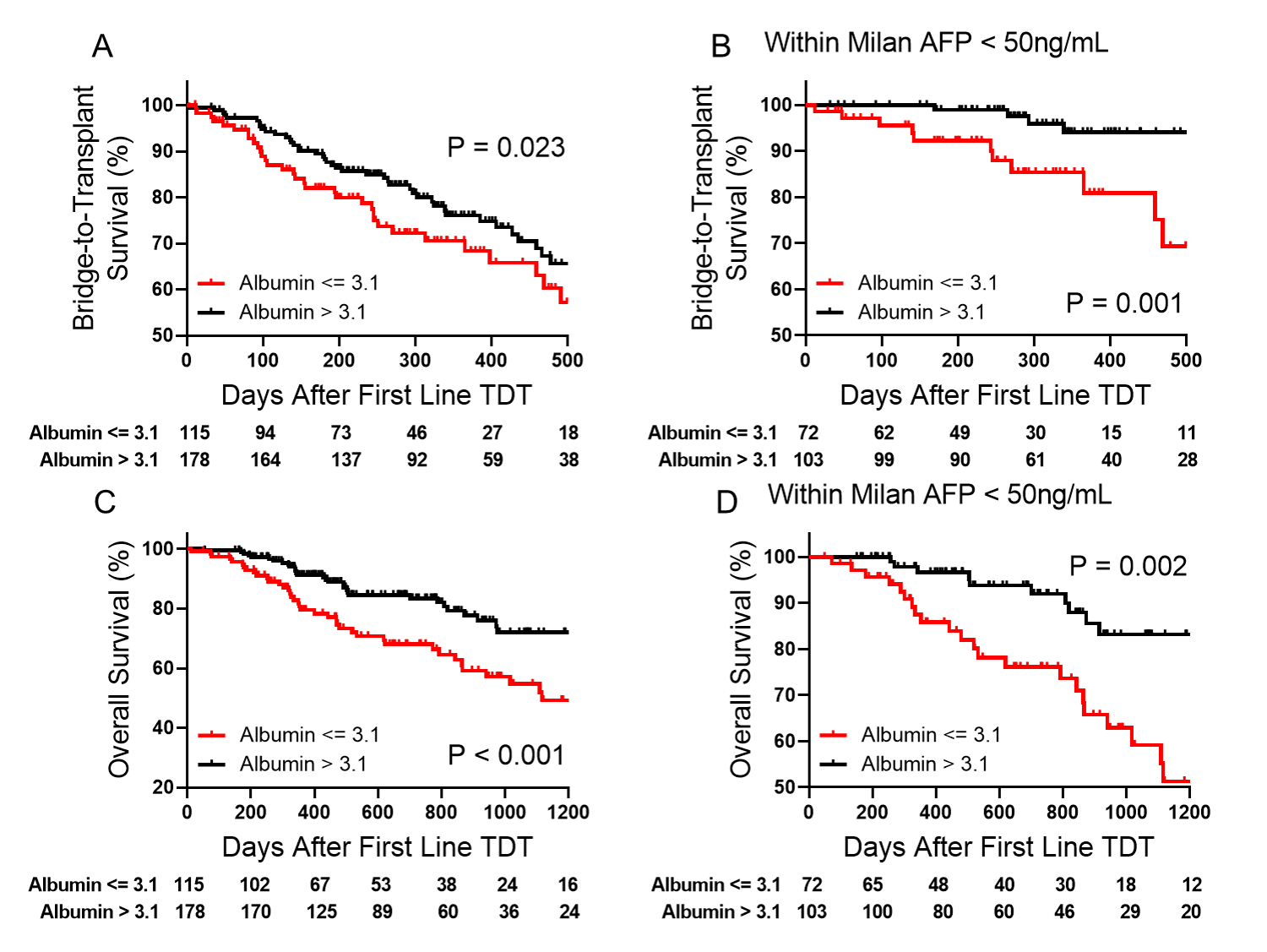Albumin Level Prior to Liver-Directed Therapy is a Risk Factor of Waitlist Tumor Progression Independent of HCC Burden
Ochsner Health, New Orleans, LA
Meeting: 2021 American Transplant Congress
Abstract number: 1122
Keywords: Hepatocellular carcinoma, Immunosuppression, Outcome, Risk factors
Topic: Clinical Science » Liver » Liver: Hepatocellular Carcinoma and Other Malignancies
Session Information
Session Name: Liver: Hepatocellular Carcinoma and Other Malignancies
Session Type: Poster Abstract
Session Date & Time: None. Available on demand.
Location: Virtual
*Purpose: Milan Criteria, α-fetoprotein (AFP), and MELD score at diagnosis influence prognosis in bridge to transplant (BTT) hepatocellular carcinoma (HCC). With HCC surveillance many patients are diagnosed within Milan with both low AFP and MELD. Albumin level decreases in the progression of cirrhosis-associated immune dysfunction toward a state of immune paralysis, which may have important implications liver-directed therapy (LDT). In this study, we examine albumin as a risk factor for tumor progression following LDT, particularly in ideal BTT patients within Milan with a low AFP.
*Methods: Retrospective study of patients receiving first-line LDT as a BTT within a single system (April 2016 – March 2020). Parameters were analyzed prior to first-line LDT and patients monitored for BTT survival and BTT outcome.
*Results: Analyzed were 294 treatment naive HCC patients with median age of 63 years (IQR 59 – 66 years) and demographics of 75% male with predominant hepatitis C etiology (66%). Patients were 80% within Milan with 69% having an AFP ≤ 50 ng/mL. Study endpoint was reached in 186 patients: 33% transplanted, 30% dropout due to tumor progression, with 25% censored and 12% waitlist active at data analysis. Albumin level stratified 0.3 g/dL tiers from < 2.9 g/dL to > 3.8 g/dL revealed that lower albumin levels directly correlated with history of decompensation requiring intervention (P<0.001) with incremental rise in MELD-Na score with decreasing albumin tier (P<0.001). However, there was no association between albumin level and Milan status (P=0.121) or AFP level (P=0.377). In multivariate analysis controlling for Milan and AFP, albumin level was independently associated with BTT survival (HR 0.79, 95% CI 0.66 - .93) and BTT outcome (OR 0.70, 95%CI 0.53 - 0.92). In patients within Milan with an AFP < 50 ng/mL, albumin ≤ 3.1 g/dL was associated with a significant decrease in bridge to transplant survival (P = 0.001).
*Conclusions: Low serum albumin at HCC diagnosis identifies patients with high risk of post-treatment tumor progression. This increased risk may be due to immune paralysis in cirrhosis-associated immune dysfunction.
To cite this abstract in AMA style:
Thevenot P, Nunez K, Sandow T, Hibino M, Wright P, Patel J, Fort D, Cohen A. Albumin Level Prior to Liver-Directed Therapy is a Risk Factor of Waitlist Tumor Progression Independent of HCC Burden [abstract]. Am J Transplant. 2021; 21 (suppl 3). https://atcmeetingabstracts.com/abstract/albumin-level-prior-to-liver-directed-therapy-is-a-risk-factor-of-waitlist-tumor-progression-independent-of-hcc-burden/. Accessed March 4, 2026.« Back to 2021 American Transplant Congress

